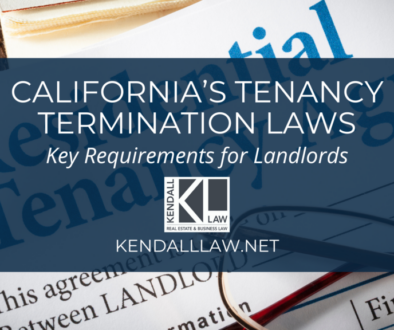New Laws in 2023 for Real Estate Professionals, Property Owners and Landlords
The following provides an overview of some of the changes in the law impacting real estate professionals, property owners, landlord tenant law and housing laws.
REAL ESTATE ADMINISTRATIVE LAW CHANGES
Broker’s Licensing Requirements: Per Business and Professions Code 10150.6 effective January 1, 2023, the 2-year experience requirement for broker’s licensing must now be within the 5-year period immediately prior to the date of the application. The commissioner may treat a degree from a four-year university wherein the course of study included a major or minor in real estate, as the equivalent of two years’ general real estate experience.
Escrows Disqualification for Drug Offense: Per Financial Code 17414.1 effective January 1, 2023, offenses involving a controlled substance are removed from the list of offenses that disqualify a person from serving in any capacity as an officer, director, stockholder, trustee, agent, or employee of an escrow agent, or in any position involving duties with an escrow agent.
Implicit Bias Training Requirement: Last year, implicit bias training was added to the mandatory course for first-time licensing and license renewals which was to take effect on January 1, 2023. This law postpones the requirement when applying for a salesperson or original broker license until January 1, 2024. Renewing licenses are required to follow the requirement as of January 1, 2023.
HOMEOWNER’S ASSOCIATION LAW CHANGES
Owner’s Right to Rent a Portion of Their Unit: Per Civil Code 4515, 4739 and 5875 effective January 1, 2023, recently passed law required a Homeowner’s Association to allow at least 25% of owners in the association to rent out their units. That law bans HOAs from prohibiting the rental or leasing of a portion of the unit (a room) while the owner occupies the unit. HOAs can still place limits and bans on short-term vacation rentals.
HOUSING LAW CHANGES
ADUs: Per Government Code 65852.2., the law is clarified to make it easier to build ADUs including limitations on locality requirements concerning front set-backs and minimum dwelling heights.
Assembly Bill 2221 prohibits local governments from imposing front setbacks standards that make it impossible to build a new ADU and incorporates changes to ADU height requirements set out in Senate Bill 897.
Senate Bill 897 adjusts the minimum ADU height limit that a local agency may impose as follows:
- For detached ADUs on a lot with existing or proposed single family, a 16-foot height limitation is allowed.
- For detached ADUs on a lot with an existing or proposed multifamily dwelling unit, an 18-foot height limitation is allowed.
- For a detached ADU within one-half mile walking distance of a major transit stop or high-quality transit corridor, an 18-foot height limitation is allowed. Also, requires a local agency to allow an additional
2 feet to accommodate a roof pitch on an ADU that is aligned with the roof pitch of the primary dwelling. - For ADUs attached to a primary dwelling, a height of 252 feet or the height limitation in the local zoning ordinance that applies to the primary dwelling, whichever is lower, is allowed.
Owner-Occupants and Non-Profits Right of First Look to buy Foreclosed Properties: The law creates a state equivalent of the Federal First Look Program that gives priority to purchasers of foreclosed properties who are prospective owner-occupants, nonprofits or public entities. The law also prohibits bundled sales of residential one- to-four properties.
Residential Housing may be Built within an office or retail zone by ministerial approval:
The Affordable Housing and High Road Job Acts of 2022 creates a ministerial, streamlined approval process for 100% deed-restricted affordable housing projects in commercial zones and for mixed-income housing projects along commercial corridors.
Residential Housing may be Built within Office or retail zoning: This law enacts the Middle Class Housing Act of 2022, which establishes housing as an allowable use on any parcel zoned for office or retail uses.
Limitations on local Parking Requirements: A public agency is prohibited from imposing any minimum automobile parking requirement on any residential, commercial, or other development project that is located within a half-mile of a major transit stop. Where the development contains 20 units or more, an exception could apply where locality makes a finding that such prohibitions would have a substantial negative impact on residential or commercial parking within half a mile of the housing project.
Homeowners may add up to two bedrooms within an existing dwelling unit: A city or county shall not adopt or enforce an ordinance requiring a public hearing as a condition of reconfiguring existing space to increase bedroom count within an existing dwelling unit.
LANDLORD TENANT LAW CHANGES
Reusable Tenant Screening Reports: Establishes criteria for the voluntary acceptance of a reusable tenant screening report (RTSRs) by a landlord and specifies the applicant information that must be included in the RTSR. A landlord that accepts RTSRs may not charge either a fee for the landlord to access the report or an application screening fee.
Termination of Tenancy Protections for Victims of Domestic Violence: The new law imposes a statutory penalty of $100 up to $5,000 (in addition to actual damage) when a landlord or agent ignores a tenant’s right to terminate a lease based on acts of domestic violence. The prior law prohibited a landlord from evicting a tenant who was victim of domestic violence, based on acts taken against the victim. However, if the perpetrator was in residence in the same dwelling as the victim, the prior law offered no protections. The new law requires a partial eviction order only against the perpetrator of abuse when the perpetrator is in residence in the same dwelling on the unit.
SALES TRANSACTION LAWS
Disclosures: Disclosure required by the Transfer Disclosure Statement (TDS) law in effect on the date the parties enter the contract shall be the disclosure law that applies to the sale contract. Any subsequent changes to the TDS law after the parties enter the sales contract will not apply to that contract, unless a statute specifies otherwise.
MOBILE HOME PARK LAW CHANGE
Manager Training: The law requires managers and assistant managers of mobile home and recreational vehicle parks to complete an online training and renew the training every year.
PROPERTY TAX LAW CHANGE
Defers Property Tax for those waiting for Prop 19 Exemptions: The law defers property taxes for taxpayers claiming Proposition 19 base-year value transfers when the county assessor has not completed its determination of the property’s eligibility for property tax relief under this section.
A lot has changed in a number of areas in real estate matters for landlords, property owners, property managers, real estate brokers and agents. If you need more clarification on any of these areas, or would like to book us to speak to your group about these laws, please contact us or call (310) 619-4941. Kendall Law is here and happy to help!
Author: Eileen Kendall





